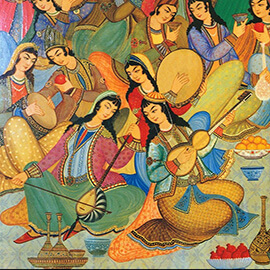
Persian Festivals
| Festival 2020-02-23 09:37:19
Iran, the land of rich civilization, is a magnificent treasure of art and culture
Iran, the land of rich civilization, is a magnificent treasure of art and culture. It is the origin of festivities and joyous ceremonies in honor of all the values of life. These festivals have been the identity of the great people of this amazing country.

These festivals are compatible with the natural calendar and are inextricably linked with seasonal and climate change. In general, the ancient Iranian festivals are categorized in three groups: seasonal, annual, and monthly.

The first group is seasonal festivals or Gahambars (literally means “proper seasons”) designed to commemorate the creation during six times a year since based on traditional beliefs, Ahura Mazda, the God of Zoroastrianism, has created the universe in six main periods. Each period had a name which used to be celebrated over five days across the Persia and today they are held with the same grandeur among the Zoroastrians.

Avestan Calendar
The Avestan calendar named as Vohishgia is an ancient system of time reckoning formed on the basis of 12 months associated with the deities. The names of the twelve months in modern Persian and their Avestan forms with their corresponding Zodiac names are:
1. Farvardin / Fravashi Fravarti /Aries/ 21 March.
2. Ardibehesht / Asha Vahista/Taurus/ 21 April.
3. Khordad / Haurvatat /Gemini /22 May.
4. Tir / Tishtrya / Cancer /22 June.
5. Amordad /Ameretat/ Leo / 23 July.
6. Shahrivar / Khshathra Vairya / Virgo / 23 August.
7. Mehr / Mithra / Libra / 23 September.
8. Aban / Ap / Scorpio / 24 October
9. Azar / Athra / Sagittarius / 22 November
10. Dey / Dathva / Capricorn / 22 December.
11. Bahman / Vohu Manah /Aquarius / 21 January.
12. Esfandarmaz / Spentaaramaiti / Pisces / 20 February.

Persian Festivals according to Avestan Calendar, a year is divided into twelve sections (month) of 30 days, each was dedicated to an Avestan deity and was celebrated by the Zoroastrians to pay thanks Ahura Mazda and to venerate the twelve divinities.
